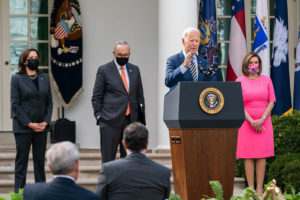
President Joe Biden, joined by Vice President Kamala Harris, House Speaker Nancy Pelosi, D-Calif., and Senate Majority Leader Charles “Chuck” Schumer, D-N.Y., delivers remarks on the American Rescue Plan Friday, March 12, 2021, in the Rose Garden of the White House. (Official White House Photo by Adam Schultz)
In pursuing another agenda for which he has no mandate, Joe Biden, president of the U.S. and proud graduate of Syracuse University Law School, began his speech on gun control:
Nothing I’m about to recommend in any way impinges on the Second Amendment. They’re phony arguments suggesting that these are Second Amendment rights in what we’re talking about.
No amendment to the Constitution is absolute.
You can’t yell ‘fire’ in a crowded movie theater and call it freedom of speech. From the very beginning, you couldn’t own any weapon you wanted to own. From the very beginning of the Second Amendment existed, certain people weren’t allowed to have weapons.
Every part of Biden’s statement is “utterly absurd,” debunks David Harsanyi in NRO.
- No amendment to the Constitution is absolute.
There are already tens of thousands of laws governing individual gun ownership in the United States. There are more laws restricting this guaranteed individual right than any other in the Constitution. The notion that gun ownership is “absolute” — or anything in the proximity of absolute – is preposterous beyond words. Imagine your freedom of speech being contingent on an FBI background check? (Though maybe we shouldn’t give progressives any ideas.)
- You can’t yell “fire” in a crowded movie theater and call it freedom of speech.
You absolutely can, argues Mr. Harsanyi.
This is probably the weakest – and the most infuriatingly overused — analogy used in efforts to restrict rights. The line, taken from Oliver Wendell Holmes’ decision in Schenck v. United States and subsequently repeated by thousands of censorship apologists since, was at the heart of one of the most egregious violations of free expression in American history.
The Schenck decision allowed the Wilson administration to throw anti-war activists into prison for violating the Espionage Act of 1917. It’s difficult to think of a more legitimate exercise of political expression than debating war and peace. In any event, Schenck was basically overturned by the Brandenburg v. Ohio decision, which found that the First Amendment protects speech unless it is likely to incite “imminent lawless action,” which yelling “fire in a theater” does not.
- From the beginning, you couldn’t own any weapon you wanted to own.
Mr. Harsanyi can’t imagine what rickety basis there is for making such a claim. David wrote a book on the history of American guns, and never once, he claims, did he run across any law that restricted Americans from owning any weapons they desired (unless you’re talking about blacks or Indians; because most gun restrictions in U.S. history have been employed to unarm the people who need weapons most).
The idea of the federal government conducting any kind domestic “gun policy” whatsoever would have been a completely alien concept to anyone before the 1930s. Even then, no specific types of guns were banned from use. It wasn’t really until 1986 that that fully automatic guns were effectively banned by the federal government.
If you’re willing to fight for Main Street America, click here to sign up for the Richardcyoung.com free weekly email.





